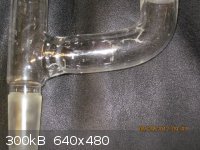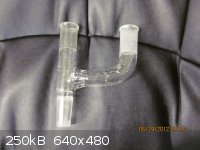jamit
Hazard to Others
  
Posts: 375
Registered: 18-6-2010
Location: Midwest USA
Member Is Offline
Mood: No Mood
|
|
etched beakers and flask
I just received a bunch of beakers and flasks, which is great, but most of them are etched... probably due to potassium hydroxide attacking the
glassware.
Is there a problem in using these beakers and flasks for general chemical reactions. Would they contaminate anything? Is the reaction of potassium
hydroxide and glass, permanently there but inert so as to not interfere with chemical reactions?
Anyone have this problem with etched glassware and what have you done with them? I have about 25 such beakers and flasks in volumes of 100, 150,250,
and 400ml.
|
|
|
SulfurApothecary
Harmless

Posts: 37
Registered: 26-6-2012
Location: Boise
Member Is Offline
Mood: For science!
|
|
You will probably be fine, don't worry to much about it. As long as they don't have cracks in it you should be good. Though the pretty factor lessens

You can't arrest me, it was for science!
|
|
|
edgecase
Hazard to Self
 
Posts: 65
Registered: 4-11-2011
Location: Ontario, Canada
Member Is Offline
Mood: Viscous
|
|
I have been wondering if a glassblower could "repair" etched glassware, maybe by heating it so it flows on the surface, but doesn't deform the shape
of the vessel? Anyone ever asked a glassblower that?
|
|
|
inspector071
Hazard to Self
 
Posts: 69
Registered: 20-2-2012
Member Is Offline
Mood: No Mood
|
|
The glass blower in the glass shop at my university said the only way to fix scratched/etched glass is to indeed heat it to its transition point. I
may bring a few of my scratched up filter flasks and see if he can make them look new again.
|
|
|
chemrox
International Hazard
    
Posts: 2961
Registered: 18-1-2007
Location: UTM
Member Is Offline
Mood: LaGrangian
|
|
I etched some by cleaning them in an ultrasound with a metal basket and with smaller pieces getting into the larger ones. I've run into something
really strange though. I left some glass in the sink for a couple of months. This was resistant to cleaning so it was left in soapy water for
another day and maybe some more vigorous treatment. Anyway it got forgotten while some writing was being done. The water got some kind of mold
growing in it. As soon as I noticed that I started cleaning. It took four fill and empty cycles and a box of alconox to get rid of the shit and a
number of pieces were etched. I'm baffled. The etches look like the mold patterns left by the dead mold after the first new fill of soapy water. I
didn't use any strong base in the wash water or anything besides alconox. If anyone else has encountered this please tell me about it. I have not
used any flouride compounds the past year at least. In fact I can't recall any, ever. Some of the glassware I picked up off ebay has been "Laboy."
Is it softer than other borosillicates?
 
[Edited on 29-6-2012 by chemrox]
"When you let the dumbasses vote you end up with populism followed by autocracy and getting back is a bitch." Plato (sort of)
|
|
|
Fossil
Hazard to Others
  
Posts: 131
Registered: 4-4-2012
Location: Canada
Member Is Offline
Mood: No Mood
|
|
Try going at your "moldy" with fuming HCl. I use this whenever organic matter gets stuck on my glassware and by organic I mean something with once
living cells. Its never failed me.
|
|
|
Funkerman23
Hazard to Others
  
Posts: 416
Registered: 4-1-2012
Location: Dixie
Member Is Offline
Mood: No Mood
|
|
Been having some issues with this as well. It's either water scale or somehow the joint grease& hot water did something. I'll try the HCL trick
myself and see if that helps. I suspect it is "softer" glass as well. However acetone did nothing to lift the trouble so I can't really say.
" the Modern Chemist is inundated with literature"-Unknown
|
|
|
Hexavalent
International Hazard
    
Posts: 1564
Registered: 29-12-2011
Location: Wales, UK
Member Is Offline
Mood: Pericyclic
|
|
Why have you reported it?
Personally, when I leave glassware to soak in water, I often add a little bleach to the water to avoid the formation of microorganism colonies.
"Success is going from failure to failure without loss of enthusiasm." Winston Churchill
|
|
|
Dr.Bob
International Hazard
    
Posts: 2748
Registered: 26-1-2011
Location: USA - NC
Member Is Offline
Mood: No Mood
|
|
Etched glass is not substantially weaker. But I don't like it either. I save those items which are etched for running messy reactions (tar
forming, Fl-, or HO- or other etching type reactions) in, with the hope that at least if I ruin them, they were already ugly.
I have never had any luck making glass pretty by annealing it. Repaired etched glass always looks ugly to me after annealing still. I think you have
to go hotter than that to remove the etching.
I have also seen goo form in glassware from minerals and mold. I think they cause the mineral to deposit, I agree with the HCl idea. But I have
found some glassware that gets dirty just won't come clean, in either a base or acid bath, often it may be etched or something and maybe something ppt
on the etched surface and just won't let go. Again, I just save those flasks for messy reactions and don't worry too much.
I also had a beaker with two small cracks in it that I have used for years now, it finally got an open crack on the top, but it still did not break,
and the other two cracks near the bottom did not fail even with the added stress. It is a Pyrex brand beaker, and I will say that their stuff is
great, and takes abuse in the lab well. That is one area where I don't skimp, I try to only buy Pyrex beakers, at work, by the case they are only
slightly more expensive than cheap ones, and they last years longer in the real world.
|
|
|
watson.fawkes
International Hazard
    
Posts: 2793
Registered: 16-8-2008
Member Is Offline
Mood: No Mood
|
|
Quote: Originally posted by Dr.Bob  | | I have never had any luck making glass pretty by annealing it. Repaired etched glass always looks ugly to me after annealing still. I think you have
to go hotter than that to remove the etching. |
That's right. At the annealing temperature, you get relief of
internal stress, but the glass doesn't appreciably soften. In order to remove etching or scratching, the glass would have to be mobile enough that
surface tension has a chance to act. That might be possible right at or below the softening point, using an extended heat soak, though I don't know
for sure.
|
|
|
Dr.Bob
International Hazard
    
Posts: 2748
Registered: 26-1-2011
Location: USA - NC
Member Is Offline
Mood: No Mood
|
|
And of course heating above the annealing temp would ruin any joints (24/40 etc), kill calibrations on volumetric glass, and likely ruin stopcock
joints and other complex pieces. Not worth the trouble.
|
|
|
zed
International Hazard
    
Posts: 2284
Registered: 6-9-2008
Location: Great State of Jefferson, City of Portland
Member Is Offline
Mood: Semi-repentant Sith Lord
|
|
You could re-polish the glass via motorized buffing, in areas that are accessible. Cerium oxide might work nicely as a buffing agent. The surface
of the glass actually flows and seals. This however, does not cause great generalized heating, and the polished glass probably will not require
annealing. It is a surface phenomena that was not well understood in the past. I haven't checked lately.
This physical/chemical process is used in lapidary work, to polish most stones. Quartz and Glasses, being among them.
|
|
|